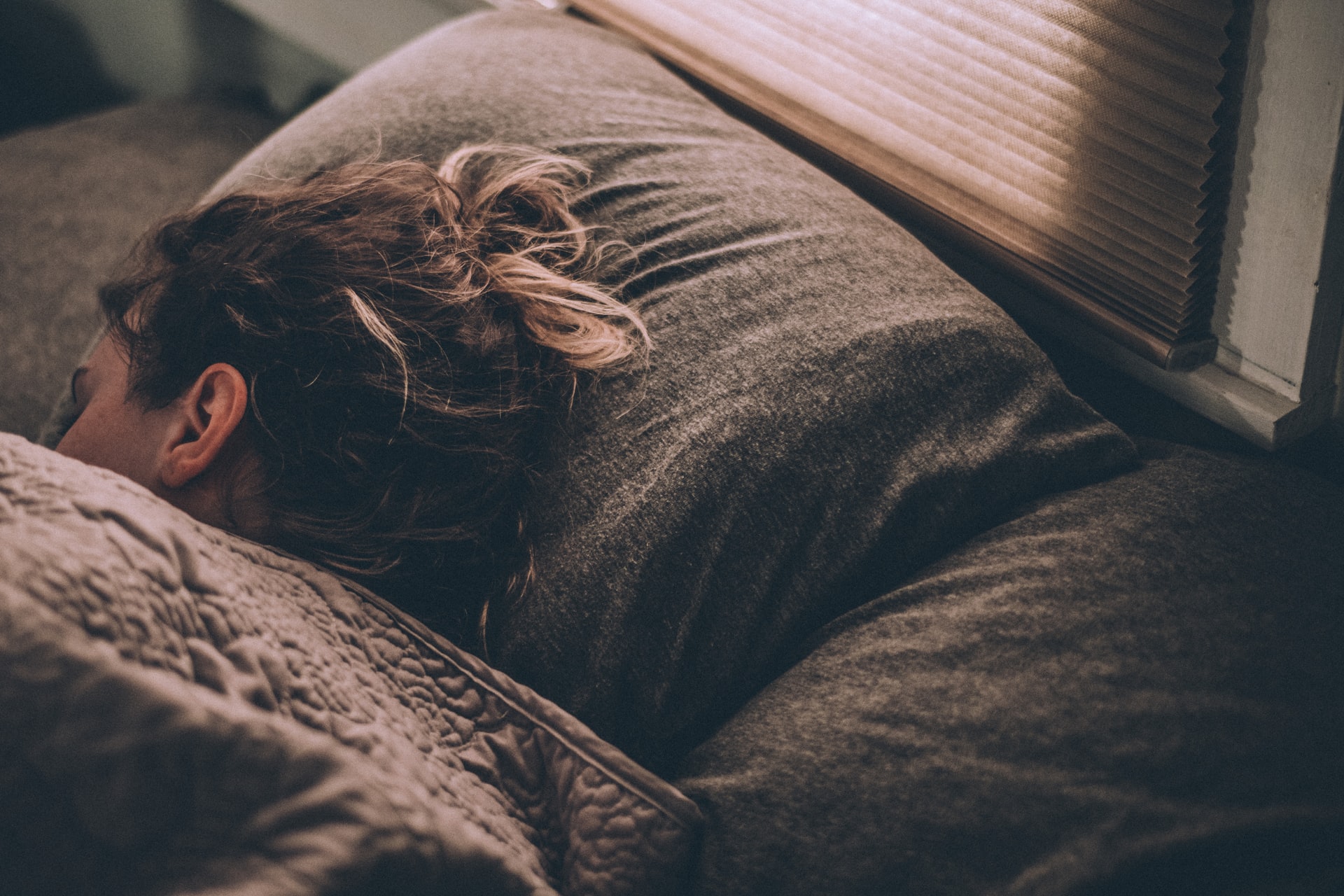Moms, do you often find it more difficult to nod off than to perform daytime mother duties at times?
It may seem odd for some who plop down their bed with ease, but it’s quite common to experience a sleep cycle that’s different from the norm.
However, that doesn’t mean it’s a good thing! Lacking sleep might have negative consequences such as decreased productivity and irritability in the mornings, resulting in a terrible day.
Fortunately, there are ways to ensure that you’re getting the rest you need for those busy days ahead of you.
Here is everything a mom needs to know about sleeping better.
In This Article
- 1. Limit nap time
- 2. Sleeping with a snorer?
- 3. Don’t drink caffeine after lunchtime
- 4. Stress less!
- 5. Reduce blue light exposure
- 6. Use the right pillow and mattress
- 7. Create a relaxing bedtime routine
- 8. Try a sleeping mask
- 9. Use earplugs to block noise
- 10. Get to bed at the same time every night
- 11. Be mindful of your diet
- 12. Cut down on vices
1. Limit nap time
It’s easy to doze off in the afternoons or early evenings when you lack sleep during the night. However, you should avoid taking naps as it will make it harder for you to spend time sleeping come evening.
Instead, try getting some outdoor exercise or spend some time with your loved ones to boost your energy levels. If you really have to take a nap, the recommended amount of time to nap is around 15 to 20 minutes.
2. Sleeping with a snorer?
If you or your partner snores frequently during sleep, it may be beneficial to get them a CPAP machine to help them enter a more relaxing sleep state. This way, you’ll solve any issues you might have about your partner’s loud snoring.
If that doesn’t work out for whatever reason, consider consulting a sleep doctor if you or your partner are experiencing severe sleep apnea or other breathing problems when you try to sleep.
3. Don’t drink caffeine after lunchtime
Are you a frequent coffee drinker? If so, limit consumption of it to only in the mornings! Consuming caffeine later during the day reduces your quality of sleep. It’s recommended to avoid it in the afternoon so that the effects of caffeine won’t be in effect during nighttime.
If you must drink coffee later in the day, try drinking decaf instead. Decaffeinated beverages don’t contain any traces of stimulants, making them better options for you to sleep better.
4. Stress less!
Stress is a big culprit for insomnia, so if you want to get better sleep quality, lower your stress levels!
While easier said than done, especially as a full-time mother, taking the time and effort to wind down your stress levels will help loads in your fight against sleeplessness.
Meditation and yoga are two ways you can relax before bedtime. This helps you cool off your head from all the daytime madness at work or home.
5. Reduce blue light exposure
If you want to get better sleep, it’s crucial that you reduce blue light exposure in the hours before bedtime. Blue light is emitted from electronic devices such as laptops or TV screens. It has been proven to decrease your levels of melatonin, a hormone responsible for making you feel sleepy.
Alternatively, you can use blue-light-blocking apps like f.lux or your built-in blue-light blocking settings if you’re using compatible devices such as your Windows computer or the latest Android phones.
6. Use the right pillow and mattress
A comfortable pillow is crucial as it supports your neck, head, and shoulders while you sleep. This helps prevent any pains that might disrupt your sleep.
Likewise, a mattress is important for giving you the right amount of support while you lie down. If it’s too firm, you won’t be able to get comfortable. Likewise, if it’s too soft or worn out, not only will it disrupt your sleep but it will also put more stress on the rest of your body when you lie down.
7. Create a relaxing bedtime routine
A bedtime routine is another way to train your body into getting ready for sleep. It doesn’t have to be complicated – making sure that you consistently do it will help your body adjust to your sleep schedule and get better sleep quality.
For example, taking a hot shower before bed is a great way to relax your muscles and alleviate stress throughout your body. Drinking a warm glass of milk or reading a book a few minutes before bedtime can also get your body prepared to doze off.
8. Try a sleeping mask
If your room has distracting light sources that may pose a threat to your sleep schedule, try using a sleeping mask to cover your eyes. This way, you can encounter fewer distractions and get a more relaxing sleep. This is especially useful if you sleep with a partner who can’t help but use their phones every night.
If you’re not fond of sleeping masks or they don’t work for you, consider using blackout curtains instead. These will cover your windows and keep out light just as well.
9. Use earplugs to block noise
Speaking of distractions, if you want to get better sleep quality, a good-quality pair of earplugs can do a pretty good job of keeping out noise.
If you live in a noisy neighborhood or you have children/pets that keep you awake, earplugs can be your best friend.
10. Get to bed at the same time every night
By setting a similar time to go to bed, you train your body to know when it should be tired. This will help you recalibrate your circadian rhythm and make you sleep at an earlier time. Consequently, this will allow you to wake up early too while still feeling refreshed to take on the new day. Even without an alarm clock!
11. Be mindful of your diet
Sleeping better is one thing. But if you want to get better sleep quality, it’s best to work on your heart health as well. An unhealthy diet can cause more stress and anxiety that might disrupt your sleep schedule.
Consider eating a more heart-healthy diet by adding vegetables, fruits, and lean proteins into your regular diet plan. Additionally, you should try to avoid certain foods that have refined carbs and sugar as they can cause more disruptive sleep as well as insulin spikes.
12. Cut down on vices
The consumption of alcohol and vices like cigarettes and alcohol can also affect your sleep schedule. Nicotine is a harmful stimulant that keeps you awake for longer than you should, and alcohol also makes you more groggy the next morning if taken too close to bedtime.
If you really want to get better sleep, consider cutting down on any vices you have that might be affecting your sleep quality.











